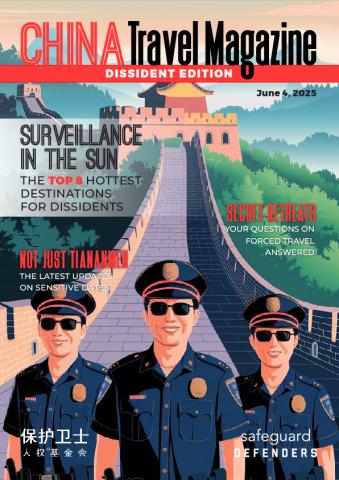Holidays in handcuffs: new report examines forced travel in China

Safeguard Defenders is marking the 36-year anniversary of China’s Tiananmen Square Massacre with a new publication on a seldom-reported, unusual type of arbitrary detention that Chinese police routinely carry out on activists around this time.
China Travel Magazine: Dissident Edition examines the illegal practice of forced travel, where the Chinese Communist Party (CCP) disappears its critics on secret trips to keep them silent at sensitive times.
China Travel Magazine is the first time that this bizarre type of arbitrary detention has been explained in such detail. We used interviews and media reports to show what forced travel looks like, how it changed during COVID and after COVID, and even include a calendar to show the peak periods when activists are forcibly taken on trips.
We have designed our new report to look like a luxury travel magazine to attract more attention on this issue. We’re also using the format to satirize a human rights abuse that the CCP has absurdly dressed up to look like a holiday.
Within the glossy pages of China Travel Magazine: Dissident Edition, we also include a map of the country showing some of the actual forced trips that activists went on in the past few years and look at how local cash-strapped governments may now be scaling back forced travel budgets.
While forced travel is not as draconian as the CCP’s other tools of repression used against activists and petitioners, such as Residential Surveillance at a Designated Location, psychiatric detentions, collective punishment of family members or criminal prosecution and yearslong prison sentences, it is still a form of arbitrary detention. It violates the fundamental human rights to freedom, liberty of movement, expression and privacy. Some activists have been forced to go on trips while a loved one is dying back home.
On June 4, 1989, the CCP sent in the army to break up a peaceful protest by students and workers in central Beijing. Estimates put the toll at several thousand people dead.
For the past two decades, as the anniversary of the killings approaches, Beijing police have taken prominent activists, including rights lawyers, independent journalists and intellectuals on “holiday” for a week or two, ensuring sure they won’t be around or online to post or comment to media about the massacre.
This year is no exception. Media reported that on 30 May police took Beijing-based, independent journalist Gao Yu (who is in her 80s!), on a forced trip and that Guizhou activist Ji Feng had received a call warning him he would also be travelled for these few days. At 9pm on 28 May, Gao posted on X that she would not be able to tweet [for a while], in a reply to her own tweet about heightened security connected to June 4.

While the Tiananmen Square Massacre is one of the most popular times for police to carry out forced travels, it’s not the only one.
The CCP uses this method (and others such as house arrest) to silence activists during other sensitive events too including big political meetings, such as the Two Sessions in spring, major international events, such as the 2020 Winter Olympics and visits by foreign officials, such as diplomats and heads of state.
In recent years, the list of sensitive dates has expanded with new major human rights incidents taking place and China hosting more international events. Recent additions include the anniversaries of the 709 Crackdown on human rights lawyers (2015), the death of imprisoned intellectual Liu Xiaobo (2017) and China’s Belt and Road forums.

Forced travel can take many different forms. For some more prominent activists, it can mean staying in a nice hotel, albeit sharing your room with the police, visiting scenic tourist spots and going out for lavish dinners. Others may be squirrelled away to a basic hotel and confined to their rooms. In some cases, police arrange accommodation and simply order the target out of town, where they are under surveillance.
The travel could be to a far-off province or simply the suburbs of the city they live in. It can last just a few days to several weeks. Sometimes the target is allowed to bring family members. There is some evidence that occasionally police and officials compete to administer forced travels because they get a free, all-expenses holiday.
Post-Covid, however, budgets for stability maintenance have reportedly been squeezed. This means that forced travels are sometimes being replaced by variations of house arrest, or trips are cut short and taken to less far-off or glamourous destinations.
This year, many activists who would have been forced travelled in the past, such as veteran rights lawyer Pu Zhiqiang, were placed under a loose form of house arrest, according to media reports.
China Travel Magazine: Dissident Edition adds to an already extensive collection of Safeguard Defenders’ reports on the CCP’s wide range of types of arbitrary detention and enforced disappearance. We conduct this research as a way to document Beijing’s human rights abuses, serve as a witness to history, and to help raise attention to these issues.
We welcome you to download your copy of the magazine here and check out our many other reports in the publications section.


